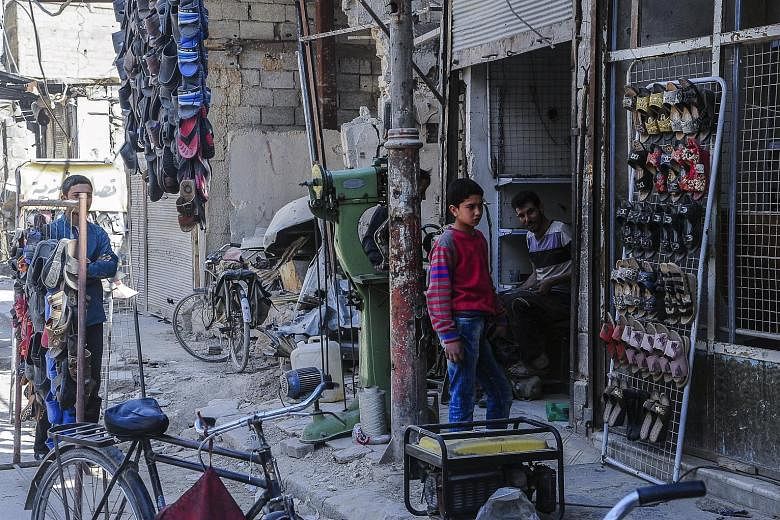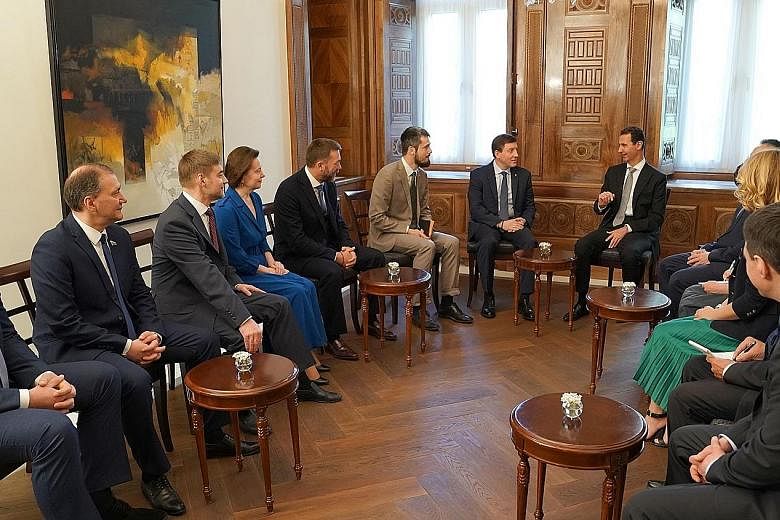WASHINGTON • The Trump administration has signalled that it will impose new sanctions as soon as this week on Russia for supporting the Syrian regime as it allegedly conducted a deadly chemical attack against its own people.
US Ambassador to the United Nations Nikki Haley on Sunday announced the sanctions and US President Donald Trump's commitment to staying involved in the Syrian crisis, hours before French President Emmanuel Macron took credit for helping to turn around Mr Trump's plan to withdraw US troops.
"Ten days ago, President Trump was saying that the United States would disengage from Syria," Mr Macron said on Sunday night. "We convinced him that it was necessary to stay there long term."
Ms Haley, speaking on television, suggested there were no plans to pare down the US presence in Syria any time soon.
She said troop withdrawal would come after three goals had been accomplished: defeating Islamic State in Iraq and Syria (ISIS) militants, ensuring chemical weapons will not be used, and maintaining the ability to watch Iran.
The aim, she said, is "to see American troops come home, but we are not going to leave until we know we have accomplished those things".
The White House, meanwhile, said Mr Trump still wants US forces in Syria to return home as soon as possible. "The US mission has not changed - the President has been clear that he wants US forces to come home as quickly as possible," White House spokesman Sarah Sanders said in a statement.
Mr Macron yesterday sought to clarify his comments and emphasise a common strategy with the Trump administration.
"I did not say that either the US or France will remain militarily engaged in the long term in Syria," he said. "We have a military objective in Syria and one only: The war against ISIS."
He said their countries' military engagement "will finish the day that the war against Daesh has been completed", using another name for ISIS.
Ms Haley said the new round of sanctions will target Russian firms that have helped Syrian President Bashar al-Assad's government make and deploy chemical weapons.
A suspected chemical weapons attack on April 7 spurred the US, France and Britain to launch more than 100 missiles at Syria over the weekend.
"You will see that Russian sanctions will be coming down," Ms Haley said. "And they will go directly to any sort of companies that were dealing with equipment related to Assad and chemical weapons use."
The sanctions are meant to show the US holds responsible not just the government of Mr Assad, but also his patrons in Russia and Iran.
Mr Trump has vowed that Syria's allies will pay a "big price" for facilitating the suspected use of poison gas. But it remained unclear how far he would go in trying to shape events in Syria, which has been racked by civil war for seven years.
Russia has vetoed at least six resolutions in the UN Security Council regarding chemical weapons. The Russian vetoes have been one of the main irritants in Moscow's strained ties with Washington, with Western diplomats accusing Russia of trying to protect the Assad government.
Russian Deputy Prime Minister Arkady Dvorkovich said yesterday the government was discussing possible measures to support Russian companies hit by new US sanctions, the RIA news agency said.
The Trump administration has placed sanctions on Russian individuals and entities, including penalties targeting oligarchs who are close to President Vladimir Putin.
The United States yesterday accused Russia of blocking international inspectors from reaching the site of the suspected poison gas attack in Douma, and said Russians or Syrians may have tampered with evidence on the ground.
Moscow immediately denied the charge and blamed delays on the retaliatory US-led missile strikes at the weekend.
Meanwhile, British Prime Minister Theresa May faced criticism yesterday for bypassing Parliament to join the US and France in Saturday's air strikes. She said the limited strikes were necessary to ease further humanitarian suffering caused by chemical weapons attacks.
"We have not done this because President Trump asked us to, we have done it because we believed it was the right thing to do, and we are not alone," she told Parliament.
She said the government also needed to act quickly to ensure the safety of those carrying out the operation.
WASHINGTON POST, NYTIMES, REUTERS


